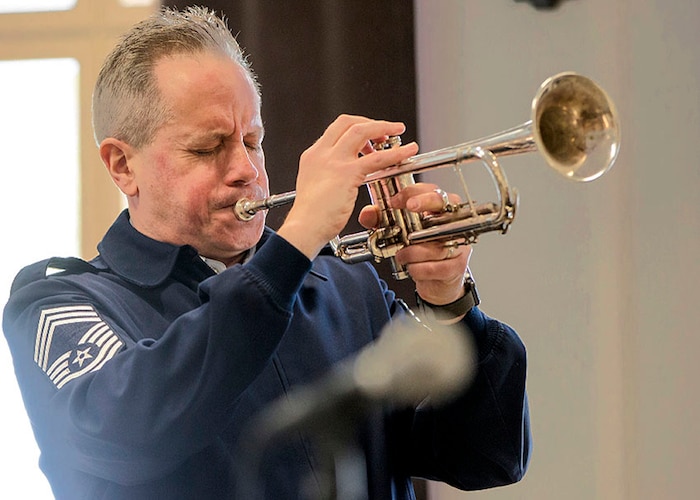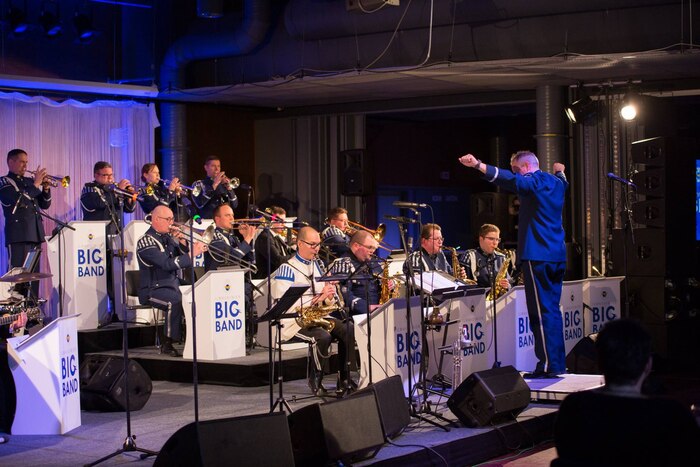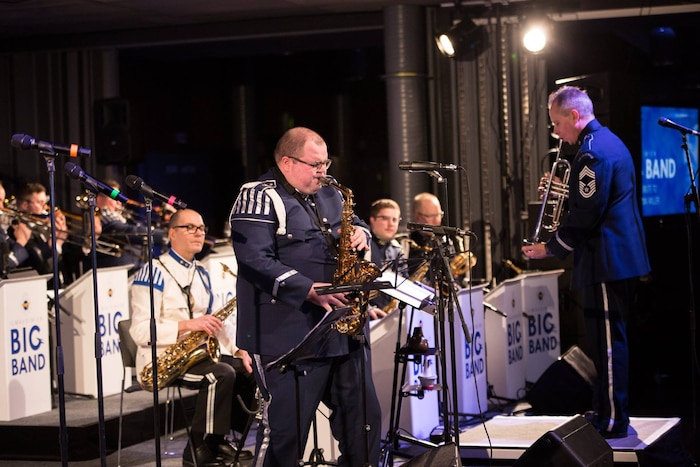JOINT BASE ANDREWS, Md. -- From Maj. Glenn Miller’s Birthplace Museum in the town of Clarinda, Iowa: In 1944, three years into the U.S.’ involvement in World War II, Glenn Miller’s Army Air Force Band opened with their song “Moonlight Serenade” in a giant steel hangar on Thurleigh Army Air Force Base, Europe. Over 3,000 men with the Eighth Air Force sat on the dirt floor, on the wings of planes and on the lofty beams overhead. Their youthful, homesick hearts throbbed to the tempo of the familiar sound. When Miller walked on stage an eerie yell of welcome swelled from the audience. It was a happy cry filled with the wildness of suddenly released frustrations.
During World War II, Maj. Alton Glenn Miller and his Army Air Force Band brought the familiar sound of American jazz across the Atlantic to raise the morale of service members worn down by fighting. Long after the war ended, the genre remained strong overseas.
In 1950, the U.S. Air Force’s jazz ensemble, the Airmen of Note, was formed to ensure the impact of American jazz continues to inspire audiences worldwide.
Chief Master Sgt. Kevin R. Burns, the Airmen of Note’s flight chief and trumpeter, did just that when he visited Jyväskylä, Finland to conduct the Finnish Air Force’s band in a historic concert of Miller’s music for their centennial birthday celebration earlier this year.

Chief Burns
Chief Master Sgt. Kevin R. Burns, the U.S. Air Force’s jazz ensemble, Airman of Note, flight chief, plays the trumpet while practicing with the Finnish Air Force’s Big Band in Jyväskylä, Finland, March 2018. Burns conducted the Finish Air Force’s Big Band during a concert for the service’s centennial birthday concert. (Courtesy Photo)
1 of 3

Chief Burns
Chief Master Sgt. Kevin R. Burns, the U.S. Air Force’s jazz ensemble, Airmen of Note, flight chief and trumpeter, conducts the Finnish Air Force’s Big Band in concert in Jyväskylä, Finland, March 23, 2018. Burns conducted the band for the service’s centennial birthday concert. (Courtesy Photo)
2 of 3

Chief Burns
Chief Master Sgt. Kevin R. Burns, U.S. Air Force jazz enselble, Airmen of Note flight chief and trumpeter, plays the trumpet with the Finnish Air Force’s Big Band in Jyväskylä, Finland, March 23, 2018. Burns spent four days teaching the band 22 selections of music by Maj. Alton Glenn Miller. (Courtesy Photo)
3 of 3
The Finnish Air Force band’s senior leaders chose Burns because of his familiarity with the unique genre.
There, he spent four days teaching the band along with a local trio, the Ikonen Sisters, 22 selections of Miller’s iconic songs, including “Moonlight Serenade”.
“Playing and practicing Glenn Miller’s music under [Burns’] control really motivated the band,” Finnish Air Force Maj. Juha Ketola said. “This music has been played by many bands in Finland but never so [precisely].”
On the day of the event, Burns entered the Jyväskylä Pavilion, where over 500 military members and civilians were in attendance to hear the historic music. Between conducting songs for the band, Burns told colorful stories that introduced each selection, giving a sense of the world in 1944.
“I was able to connect with the typically reserved audience in a way that turned out to be quite remarkable,” Burns said. “I got them clapping, laughing and even dancing.”
Local critics with the Jyväskylä newspaper wrote raving reviews of Burns’ performance the following day.
“Burns revealed himself as a showman who knew how to get his audience,” wrote Pentti Ronkanen, a Finnish writer with the local newspaper. “Every gesture was filled with a burning love for music. [The band’s] playing was silky, lush, strictly accentuated, soft, moving, and beautiful as needed.”
Burns said he reciprocated a warm appreciation for the band and all those he encountered on his trip, not only professionally but personally.
“I’ve always thought the quickest way to get any two cultures communicating is to put their musicians in the same room together because they speak a universal language that translates anywhere you go – this experience proves just that,” Burns said. “I departed Finland with many new lifelong friends. That experience will stand out as one of the greatest highlights of my career.”